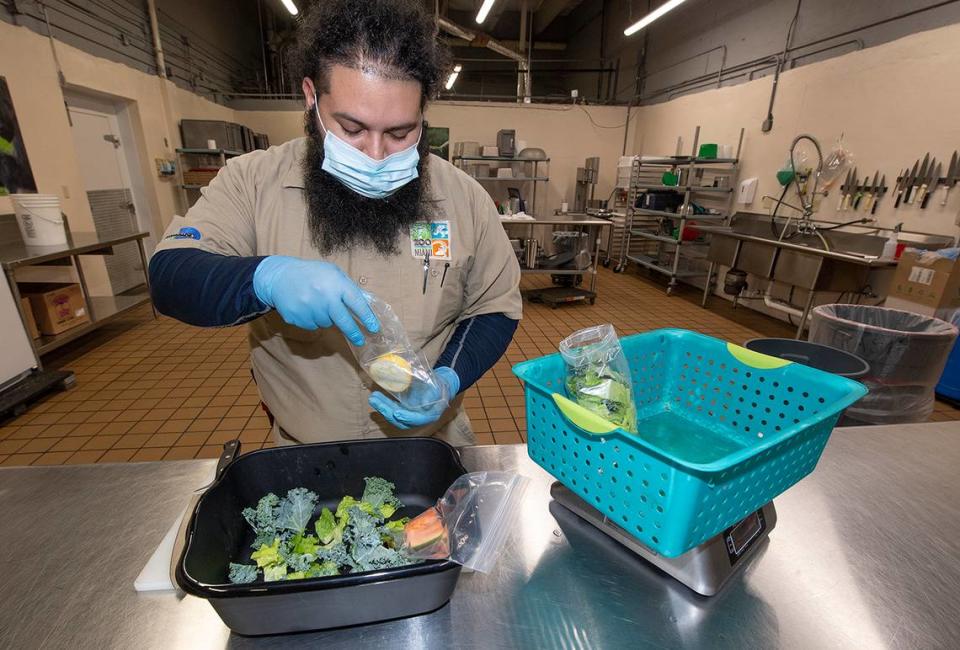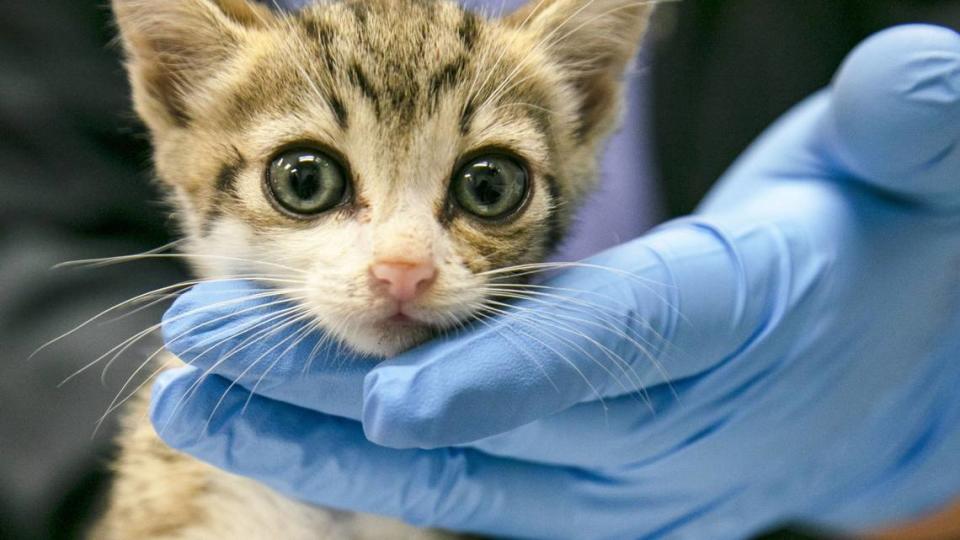A tiger in NY has coronavirus. How Florida zoos and rescues are protecting their animals
Jungle Island is giving orangutans extra puzzles to fill the void of not having daily interactions with park guests. Zoo Miami employees are wearings masks and gloves while preparing meals for the animals. And Tampa-based Big Cat Rescue keepers are spraying disinfectants after giving medication to tigers and lions.
Zoos and sanctuaries have stepped up precautions in recent weeks due to widespread concerns about COVID-19 spread in the community. On Sunday, news quickly spread that a tiger at the Bronz Zoo in New York City tested positive for the disease caused by the novel coronavirus. This is the first tiger — and the first animal in the United States — known to test positive for the disease.
The diagnosis shocked animal lovers and caretakers across the state.
“We are learning new things about this virus every day,” said Zoo Miami spokesman Ron Magill. “We have been acting with an abundance of caution.”
The wild cat in the Bronx Zoo was tested after several lions and tigers at the zoo began showing symptoms of the respiratory illness, according to the U.S. Department of Agriculture. Health officials believe the large cats fell ill after being exposed to an asymptomatic zookeeper who was “shedding the virus,” according to the federal Centers for Disease Control and Prevention.
While there are a few cases of pets outside the United States that have fallen ill with the disease after being in contact with an infected person, there is “no evidence” that pets can spread it to humans, the CDC said.
But those who care for animals are not taking any chances.
“It is better to err on the side of caution,” Magill said.
What is Zoo Miami doing to care for its 4,000 animals?
When the county and state started ramping up efforts to stop the spread of COVID-19, Zoo Miami began reviewing its policies and procedures to make sure the animals and caretakers were safe.
As of Monday, Magill said no staff members who deal with animals had tested positive for COVID-19. Employees are told to stay home if they are sick.
The county-run zoo is working with a skeletal staff, on teams and in shifts so “that if someone gets it in one team there is a backup,” Magill said.
Magill said staff discuss changes frequently and now everyone on every level, including those who prepare meals for the animals, are required to wear masks and gloves.
“We are not taking any chances,” Magill said.

While the news that the tiger in New York contracted the disease was worrisome, Magill said Zoo Miami has an advantage over zoos in the Northeast. Most of its enclosures are open-air, not closed-off buildings.
“We are hoping that is in our favor,” he said.
Has concerns over the coronavirus changed how Jungle Island cares for its animals?
The animals are pretty much keeping to their normal routine, but how that is achieved has changed, said Jason Chatfield,the vice president of zoological operations at Jungle Island. The attraction along the MacArthur Causeway is home to about 400 animals including orangutans, kangaroos and birds.

Employees are “social distancing” and are no longer doing one-on-one training exercises or spending time with the animals beyond what’s necessary to properly care for them.
While Jungle Island doesn’t have any big cats, Chatfield said they have been concerned about the primates from the beginning “because they are closest to humans.” Chatfield said the news of the infected tiger was “not completely surprising,” but it does raise added concerns.
The park’s five orangutans are given extra enrichment in their dome to keep them busy in light of their being no visitors.
“They definitely notice something going on,” he said.
But one of the biggest changes at the park is the interaction between staffers. Instead of daily meetings, there are calls and texts. Instead of communal eating, people sit at tables 10 feet apart.
“If we get sick there won’t be anyone to care for the animals,” he said.
How is Big Cat Rescue protecting tigers, lions and other cats?
Tampa-based Big Cat Rescue, which has more than 50 lions; tigers; bobcats; cougars; and other abandoned, abused, or orphaned big cats, has received a string of COVID-19 safety inquiries from concerned fans following New York’s positive tiger case, said the sanctuary’s CEO Carole Baskin.
“We have been on high alert since the beginning of the COVID-19 outbreak and have been implementing all of our regular sanitation processes and stepping those up by reminding our people to be extra diligent around the cats,” Baskin said in a video posted on Big Cat Rescue’s Twitter Monday. “At Big Cat Rescue we don’t touch the cats so there is no disease transmission by touching or getting their hands on them like you would see on roadside zoos.”
Baskin says the big cat keepers are staying six feet apart from themselves — with many wearing masks even outside — and are continuing to wear gloves, as usual, while preparing the food for the cats or cleaning their cages.
The keepers have also begun to use spray bottles of disinfectants after feeding or giving medication to the cats, many of which are 18 years or older, she said in an email to the Miami Herald.
Big Cat Rescue is also considering implementing foot baths for all of its cats as a precaution during the pandemic, Baskin said. The spa treatment is believed to remove toxins from your body and increase white blood cell activity through your feet. Baskin says the sanctuary has previously used the treatment on cats with weak immune systems.
The big cat sanctuary has been using its social media to stay connected with its visitors. Lately, its tweets have focused on advocating for the Big Cat Public Safety Act, campaigning against cub petting and “fact-checking” Netflix’s new true crime docu-series “Tiger King: Murder, Mayhem and Madness.”
The docu-series (which Baskin says spread “unsavory lies”) focuses on former zoo operator Joe “Exotic” Maldonado-Passage, who was arrested in Gulf Breeze, Florida, in 2018 and was sentenced in January to 22 years in federal prison for hiring two people to try to kill Baskin, who won a million-dollar judgment against him.
How to keep you and your pet safe from COVID-19?

While researchers believe the COVID-19 outbreak began at a live animal market in Wuhan, China, and is linked to an animal (possibly a bat), the virus is mainly spreading from person to person contact, according to the Centers for Disease Control and Prevention.
“We do not have evidence that companion animals, including pets, can spread COVID-19 to people or that they might be a source of infection in the United States,” the CDC states on its website. Health officials say there are a “very small number” of dogs and cats outside the United States who have tested positive for the virus after being in close contact with infected humans but do not believe animal infections are “playing a role” in the spread.
Magill, of Zoo Miami, fears the news an animal can get the disease may cause panic, not just for wild animals, but for domestic pets as well.
“What I don’t want is people to start panicking and dump pets off at a shelter,” he said. “There just isn’t enough known yet.”
But just as a precaution, Magill said people should try to practice social distancing with their pets as well, avoiding things such as your pet licking your face.
The CDC also suggests allowing someone else to care for your pet if you are sick, and reaching out to a veterinarian if you notice flu-like symptoms.

